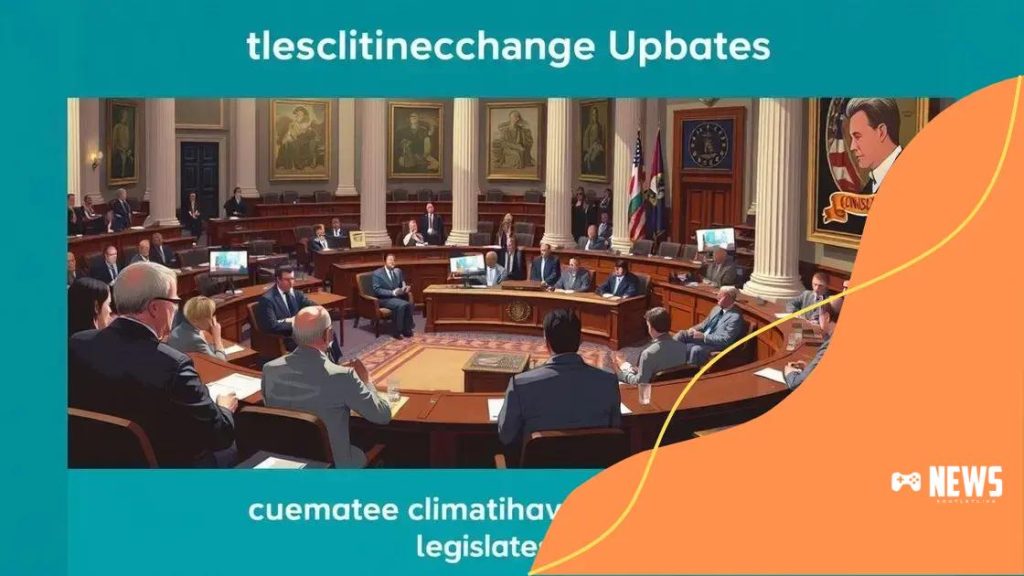Climate change legislation updates: what you need to know

Climate change legislation updates are crucial for understanding new policies that influence global efforts to reduce emissions and promote sustainable practices.
Climate change legislation updates play a vital role in shaping our response to environmental challenges. With frequent changes and new policies emerging, staying informed is essential for everyone. Are you aware of how these updates might influence your daily life?
Latest trends in climate change legislation
Understanding the latest trends in climate change legislation is crucial for grasping how global policies are adapting to our environmental challenges. Laws are evolving, and their implications ripple through every aspect of society.
Current Global Initiatives
Many countries are taking bold steps to tackle climate change. This shift is influenced by scientific research and the urgent need for action. Examples include:
- Legislation aimed at reducing carbon emissions.
- National commitments to net-zero targets.
- Incentives for renewable energy adoption.
As nations commit to these goals, the effects on citizens and businesses become clearer. For instance, individuals may see changes in tax incentives or energy costs. On the business front, companies are encouraged to innovate in green technologies.
Key Players in Climate Policy
When discussing climate change legislation, it’s important to recognize the influential players involved. Governments, NGOs, and corporations all play a vital role. Each group contributes in unique ways:
- Governments enact and enforce laws.
- NGOs advocate for sustainable practices.
- Corporations invest in sustainable solutions for compliance.
This collaboration fosters a multi-faceted approach to climate policy, which is essential for effective change. Additionally, international agreements like the Paris Accord motivate countries to push forward with ambitious plans.
Tracking these trends allows us to anticipate changes in our daily lives. Increased regulations may prompt businesses to adopt cleaner technologies faster, leading to a more sustainable future. In turn, these changes can encourage innovation and investment in renewable energy.
Ultimately, being informed about the latest developments enables citizens to participate actively in discussions about our planet’s future. By staying updated, you can better understand not just the laws themselves but also how they impact your life.
Key countries influencing global climate policies
Several key countries are shaping global climate policies today. Their actions and commitments have a profound impact on international efforts to combat climate change.
Leading Countries in Climate Action
Countries like the United States, China, and the European Union play significant roles in climate negotiations. These nations have made important pledges that influence other countries.
- The United States leads with technological innovations and policy shifts.
- China is the largest emitter but is investing heavily in renewable energy.
- The European Union is setting ambitious climate targets for member nations.
Each of these countries brings unique strengths to the table. For instance, innovations in technology from the U.S. can help reduce emissions globally. Meanwhile, China’s vast investments in solar power are changing the renewable energy landscape.
Regional Influence and Cooperation
In addition to individual efforts, regional cooperation is crucial. For example, countries in Scandinavia work together on green technology. This collaboration showcases how geographic proximity can strengthen climate initiatives.
- Scandinavian nations focus on sustainable practices.
- African nations are increasingly involved, promoting green projects.
- Asian countries collaborate on climate adaptation strategies.
Such teamwork can maximize resources and knowledge. By sharing best practices, countries can achieve greater results. Additionally, organizations like the United Nations encourage dialogue among nations to forge stronger commitments.
Understanding how these key players interact and influence climate policies is essential for everyone. By keeping track of their actions, you can better understand how global responses to climate change are evolving. This awareness helps individuals prepare for the future.
Impact of legislation on businesses and communities

The impact of legislation on businesses and communities is profound, shaping how they operate and interact with the environment. New laws aimed at addressing climate change often bring both challenges and opportunities.
Effects on Businesses
Businesses face a variety of changes due to climate legislation. These laws can affect operating costs and strategy. For example, companies may need to invest in cleaner technologies. This can lead to:
- Increased operational efficiency.
- Creation of new green jobs.
- Necessity for compliance and reporting requirements.
While these regulations might seem burdensome, they can also open doors for innovation. Companies that adapt proactively often find long-term gains. They can attract environmentally conscious consumers who prefer sustainable products.
Influence on Local Communities
Local communities also experience significant changes due to legislation. As businesses adapt, residents may benefit from healthier environments. Cleaner air and reduced pollution improve overall quality of life. Additionally, communities can expect:
- More public green spaces.
- Increased investment in infrastructure.
- Enhanced community engagement in sustainability efforts.
These changes foster a sense of community pride and responsibility. They encourage residents to participate in local green initiatives. For instance, neighborhood clean-up events or tree-planting days can become more common.
Moreover, understanding how legislation affects both businesses and communities is essential. It helps stakeholders align their strategies for mutual benefit. By collaborating, businesses and local governments can create an engaging environment where everyone thrives.
How individuals can adapt to new regulations
Individuals play a vital role in adapting to new regulations related to climate change. By understanding these rules, they can actively participate in making their communities more sustainable.
Learning About New Regulations
Staying informed about new climate regulations is essential. Individuals can keep up to date by:
- Reading local news and updates.
- Joining community groups focused on sustainability.
- Following government websites for new legislation.
Knowledge is power. Knowing the latest laws empowers citizens to make choices that align with these regulations. For instance, understanding energy efficiency standards can help households reduce their bills.
Making Sustainable Choices
Adapting to new regulations also means making conscious choices in daily life. Individuals can contribute to a greener future by:
- Reducing energy consumption at home.
- Opting for public transport or carpooling.
- Using sustainable products that comply with new standards.
These steps might seem small, but they collectively lead to significant benefits. When many individuals make sustainablechoices, they contribute to larger changes in the community.
In addition to personal actions, individuals can influence others. Sharing knowledge and encouraging friends and family to adopt greener practices promotes a culture of sustainability. Participation in local climate initiatives fosters community spirit and collective action.
Ultimately, adapting to new regulations involves a combination of awareness, personal choices, and community involvement. By staying informed and proactive, individuals can help shape a sustainable future for everyone.
Future prospects for climate legislation
The future prospects for climate legislation look promising as more countries recognize the need for urgent action. With global awareness growing, we can expect significant developments in climate policies.
Emerging Global Trends
As we look ahead, several trends are shaping climate legislation worldwide. Countries are increasingly committing to net-zero emissions by 2050. This ambitious goal drives innovation and has several key implications:
- Investment in renewable energy sources.
- Stricter regulations on pollutants.
- Development of sustainable transportation options.
These trends indicate a shift towards a greener economy. Nations are also forming new alliances to tackle climate challenges collectively.
Role of Technology
Innovative technologies will play a crucial role in shaping future climate legislation. From smart grids to carbon capture technology, the potential for new solutions is vast. For example:
- Smart energy systems can optimize resource use.
- Electric vehicles are becoming more mainstream.
- Data analytics helps in monitoring carbon footprints.
These advancements not only aid compliance with regulations but also encourage businesses and individuals to adopt more sustainable practices.
Furthermore, public demand for accountability will likely lead to stronger legislation. Citizens are becoming more engaged and vocal about climate issues. This pressure fuels governments to take bolder actions and prioritize environmental policies.
In summary, the future prospects for climate legislation appear positive as nations embrace progressive policies, technological advancements, and civic engagement. Understanding these dynamics can empower individuals and organizations to contribute effectively to sustainability efforts moving forward.
FAQ – Frequently Asked Questions about Climate Change Legislation
What is climate change legislation?
Climate change legislation refers to laws and regulations aimed at reducing greenhouse gas emissions and promoting sustainable practices.
How do new regulations affect businesses?
New regulations can require businesses to invest in cleaner technologies and adapt their operations, impacting costs and strategies.
What role do individuals play in climate initiatives?
Individuals can influence climate change efforts by staying informed, making sustainable choices, and engaging in community activities.
What are the future trends in climate legislation?
Future trends include increased global collaboration, advancements in technology, and stronger public demand for accountability and sustainability.





